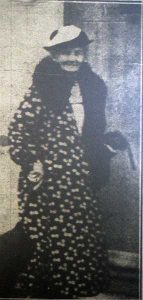
Mary was born in 1849 to John and Mary Vosper in Jersey. Her father was a Launceston born tailor who had moved to the Channel Islands for a few years before returning to Launceston. Mary married painter Alfred Body in 1874 and they set up home at No. 22, Westgate Street. They had seven children. In December 1939, on her 90th birthday, Mary gave an interview to ‘the Cornish and Devon Post’ reminiscing on her life’s experiences:
‘Travelling back along memory lane, she told how at the age of five, with her parents, she crossed to Plymouth and boarded what was daubed, “the slow bus” to travel to Launceston. With aeroplanes roaring overhead nowadays at over 200 miles an hour it seemed fantastic to hear her say that they started from Plymouth in the horse drawn coach at 6:30 in the evening and did not arrive Launceston until 3 o’clock next morning. This service was run by Mr. Tom Hodge, whose stables were situated at Dockacre.
COMING OF THE IRON HORSE
Mrs. Body recalled an amusing experience concerning coaches, which then were the sole means of locomotion. “My mother and I wanted to go to Plymouth one day,” she said. “We were too early for the coach, so started to walk on, thinking we should be soon overtaken by it. We walked to Milton Abbot but still no coach. We had some light refreshments, and walked on again. We had reached Tavistock before there were any signs of it.” One event that stands out very clearly in her mind was the extension of the G.W.R. Line to Launceston. It was a real red-letter day when the first train puffed into the station. “A tremendous crowd waited at the end of the Walk.” She recalled. “Leaflets had been distributed to us, and when the train came in sight I remember singing “Hark, I hear the whistle sounding, Onward the iron horse is bounding.” She also remembers the time when dances used to be held on the Higher Walk, which was illuminated by gas jets fixed under the trees. The music was provided by the Town Band.
SAW MEN IN STOCKS
Another picture she will never forget was the sight of two men imprisoned in stocks placed in the porch of St. Mary’s Church. These stocks have since been placed in the Museum (then in the Southgate). All trials in those days were heard in St. Mary’s Vestry (then the Guildhall), where the elections also were held. Mrs. Body has been a life-long member of St. Mary’s and her memory goes back to the ministry of Rev. G. B. Gibbons, B. A., who came to Launceston in 1837. It is interesting to trace the succeeding Vicars. Mr. Gibbons was followed by Rev. W. M. Birch, M. A., in 1866, Rev. S. W. E. Bird, in 1880, Rev. J. B. Sidgwick, M.A., in 1883, Rev. T. J. Nunns, M. A., in 1890, Rev. F. E. Lewis, Rev. N. A. Rivers-Tippet. The present Vicar, Archdeacon Canon W. H. Rigg, D.D., was among the many callers Mrs. Body received on Friday to offer congratulations to her. When our representative arrived he found her seated at a table laden with flowers, letters and gifts. Before he left two more letters came, one, which gave Mrs. Body untold pleasure, being from her son in London. She has four sons, two connected with the London Press, Messrs. Joseph T. Body, Charlie Body, Oldridge Body, and Mr. J. Body, of Launceston, and three daughters, Miss Ethel Body, of Uxbridge, Mrs. E. Hillman, and Mrs. J. Beckett. Her husband, Mr. Alfred Body, died in 1919.
What changes have taken place in Launceston in her lifetime. She has seen the development of Dunheved Road area, which in her childhood days was just fields, the levelling of the Castle Green, the erection of the Municipal Buildings and other principal buildings in the town. She can remember the wild beast shows staged in the streets. “Never think of going into a field,” she commented.
POLICE FORCE OF ONE
From the bustles and hoops of the Victorian dresses to the ‘extremelined’ gown of today represents a pointed contrast in fashions. Mrs. Body is fully conversant with the ladies tastes through the years. She began dress making at the age of 20, and carried on until two years ago. “There’s nothing to compare with the gracefulness of the Gainsborough hat,” she opined. The days when there was only one policeman patrolling the town when she paid 2d. a week to go to school, the first motor car to come to Launceston…. All these things are stored in her memory. With what interest she reads the Looking Back columns of ‘The Cornish and Devon Post.’ “The names live in my mind. I can see the events as plain as if it happened yesterday,” she told our representative. Mrs. Body is a happy and bright soul, full of spirit and courage — courage which stirred her to stop a run-away horse in Western Road — and it is the hope of her many friends that she has many more happy years ahead, and that good fortune will con
Visits: 94
